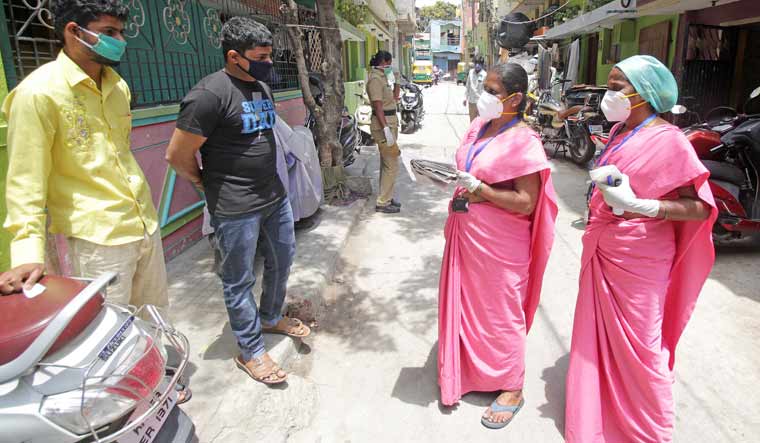At a time when India, along with the world, is battling the coronavirus, lakhs of Anganwadi and Asha (Accredited Social Health Activists) workers—mostly women—have been putting in their mite against the pandemic. They are quietly carrying out not just their regular duties of providing nutrition, food and healthcare services to expectant mothers and children; they have also been going from door to door to create awareness about the deadly disease.
The Asha and Anganwadi members have been educating people the values of hygiene and cleanliness in the wake of the spread of coronavirus. Not just that, they have been checking travel history of individuals while keeping a close watch on all migrant laborers who return home.
Sample this. Saharanpur in Uttar Pradesh is one of the many towns that have been marked red in the Covid-19 scheme of things. But that has not deterred the non-governmental organizations (NGOs), Asha and Anganwadi workers. Local authorities have set up temporary quarantine homes either inside marriage halls or other such facilities to ensure that the migrant laborers, who return home, can be housed there for days.There are kitchens running at these centres to feed the people. Several committees have been set up to monitor the return of migrant laborers and assist them in their medical check-ups before they are let free.
The ASHA and Angandwari workers have taken it on their shoulders to do a detailed personal survey of each of these migrants after which their health conditions are watched. Every three days, their temperatures are recorded while keeping a check on other health parameters. “NGOs and ASHA workers have been continuously working to ensure that the workers are not put into any kind of distress, they are given food and the quarantine facilities are made in a manner that social distancing norms can be adhered to,” Akbar Ali Khan, programme manager, Population Services International India, told IN.
Those who do not develop any temperature or other medical complications are discharged within 14 days, he added. The silent contributions of Asha and Anganwadi workers along with several members of NGOs often go unnoticed. “These foot soldiers have been the backbone of our system outside the urban areas and they must be recognized,” a senior member of the BJP said. “Life in villages is no more a drudgery as it was earlier.
We have many comforts. Healthcare facilities have improved with our Asha and Anganwadi workers,” said Ram Sakal Mandal, a native of Madhubani district in Bihar. Mandal added that while in cities the hospitals and clinics have shut their outpatient wards, healthcare facilities in the rural areas continue to remain operational, thanks to NGOs and Asha workers. “In India, the Anganwadi system serves as the backbone of the country’s fight against under-nutrition—and now against Covid-19,” said Junaid Ahmed, World Bank country director for India, in a report.
“During the coronavirus pandemic too, these women have formed a formidable front against its spread in rural India, along with other members of the rural health workforce—the local ASHA (Accredited Social Health Activist) and the Auxillary Nurse Midwife (ANM),” an article published by the World Bank said.




















